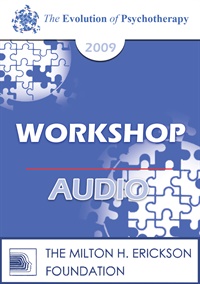
- Average Rating:
- Not yet rated
- Topic Areas:
- Consciousness | Psychotherapy | Workshops | Generative Psychotherapy
- Categories:
- Evolution of Psychotherapy | Evolution of Psychotherapy 2009
- Faculty:
- Stephen Gilligan, PhD
- Duration:
- 2 Hours 47 Minutes
- Format:
- Audio Only
- Original Program Date:
- Dec 12, 2009
- Short Description:
- The Generational Self approach emphasizes how the state of consciousness in which an experiential challenge is held determines whether a problem or solution develops. The model identifies three types of mind – Somatic, Cognitive, and Field,and how each mind can be operating at a Primitive, Ego, or Generative level. We will see how a problem degrades a person’s consciousness level so that change is impossible, and how that low-level state can be improved to a Generative level, so that the problematic experience either spontaneously changes, or is more easily engaged. Numerous practical techniques and clinical examples will be offered.
- Price:
- $15.00 - Base Price
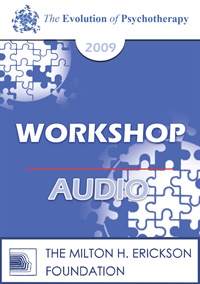
- Average Rating:
- Not yet rated
- Topic Areas:
- Workshops | Love | Emotionally Focused Therapy (EFT) | Psychotherapy
- Categories:
- Evolution of Psychotherapy | Evolution of Psychotherapy 2009
- Faculty:
- Sue Johnson, EdD
- Duration:
- 2 Hours 12 Minutes
- Format:
- Audio Only
- Original Program Date:
- Dec 12, 2009
- Short Description:
- This workshop offers participants the wisdom gained from our new scientific understanding of love, and from 25 years of research and clinical practice in Emotionally Focused Couple Therapy (EFT). The first part of the workshop will present a clear picture of romantic love as the natural arena for personal health, resilience and growth. The second part of the workshop outlines and guides participants into four conversations to enhance your relationship: Recognizing Demon Dialogues, Finding Raw Spots, the pivotal Hold Me Tight conversation, and Forgiving Injuries. Better communication, more effective problem solving, more empathetic caring and improved sexual relationships are just some of the improvements associated with a more secure bond.
- Price:
- $15.00 - Base Price
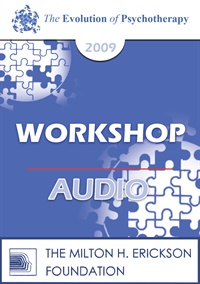
- Average Rating:
- Not yet rated
- Topic Areas:
- Workshops | Improvisation | Gestalt | Relationships | Storytelling | Psychotherapy
- Categories:
- Evolution of Psychotherapy | Evolution of Psychotherapy 2009
- Faculty:
- Erving Polster, PhD
- Duration:
- 2 Hours 48 Minutes
- Format:
- Audio Only
- Original Program Date:
- Dec 12, 2009
- Short Description:
- Dr. Polster will show how a deep relational duet can be created and, joined with therapeutic experiments and awareness expansion, provide a landscape of high focus, surprise, directionalism and radiance in the search for a sense of personal wholeness.Creation of fluidity, dependable identity, microcosmic lessons, and fresh storytelling will serve as major vehicles.
- Price:
- $15.00 - Base Price
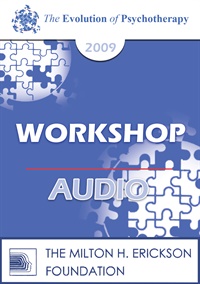
- Average Rating:
- Not yet rated
- Topic Areas:
- Psychology | Workshops | Positive Psychology | Depression | Happiness | Psychotherapy
- Categories:
- Evolution of Psychotherapy | Evolution of Psychotherapy 2009
- Faculty:
- Martin Seligman, PhD
- Duration:
- 2 Hours 6 Minutes
- Format:
- Audio Only
- Original Program Date:
- Dec 12, 2009
- Short Description:
- Happiness can be usefully dissolved into the Pleasant Life (Positive Emotions), the Engaged Life, and the Meaningful Life.The mission of Positive Psychology is to understand and build these three lives. Dr. Seligman will describe interventions that raise happiness, so defined, and will detail their effects on depression.
- Price:
- $15.00 - Base Price
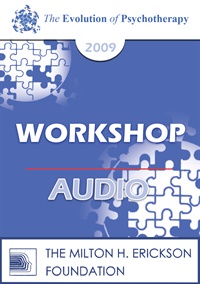
- Average Rating:
- Not yet rated
- Topic Areas:
- Workshops | Psychotherapy
- Categories:
- Evolution of Psychotherapy | Evolution of Psychotherapy 2009
- Faculty:
- Robert Dilts, BA
- Duration:
- 1 Hour 57 Minutes
- Format:
- Audio Only
- Original Program Date:
- Dec 13, 2009
- Short Description:
- Crisis, transition and transformation are three key dynamics we need to address during times of deep upheaval. It is said that things are always changing, but not always progressing. During times of dynamic change, many challenges will present themselves such as meeting the fear of the unknown and unfamiliar, dealing with loss, and a general sense of vulnerability.These can plunge us into unhelpful survival strategies: attack, escape or rigidity (fight, flight, freeze) resulting in regression, inertia and conflict. In order progress though change, it is important to cultivate qualities such as flexibility and stability, balance, connection and the ability to let go.
- Price:
- $15.00 - Base Price
Tags: Psychotherapy
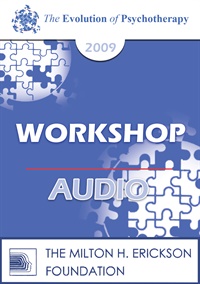
- Average Rating:
- Not yet rated
- Topic Areas:
- Workshops | Mindfulness | Acceptance and Commitment Therapy (ACT) | Psychotherapy
- Categories:
- Evolution of Psychotherapy | Evolution of Psychotherapy 2009
- Faculty:
- Steven Hayes, PhD
- Duration:
- 58 Minutes
- Format:
- Audio Only
- Original Program Date:
- Dec 13, 2009
- Short Description:
- This workshop will show how to detect and modify acceptance, mindfulness and values processes moment to moment in therapy sessions, based primarily on methods drawn from Acceptance and Commitment Therapy (ACT). The primary method used will be tape of real clinical sessions, with start and stop discussions.
- Price:
- $15.00 - Base Price
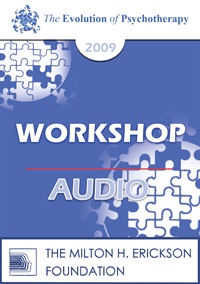
- Average Rating:
- Not yet rated
- Topic Areas:
- Workshops | Neurobiology | Psychotherapy | Relationships
- Categories:
- Evolution of Psychotherapy | Evolution of Psychotherapy 2009
- Faculty:
- Daniel Siegel, MD
- Duration:
- 2 Hours
- Format:
- Audio Only
- Original Program Date:
- Dec 13, 2009
- Short Description:
- This workshop will immerse us in an exploration of how the human brain, mind, and relationships form an interconnected“triangle of well-being” involving the flow of energy and information. The mind regulates this flow; our relationships share this flow; and the brain serves as a mechanism mediating this flow. Knowing how to work with empathic relationships, a coherent mind, and an integrated brain builds a perspective on how to approach psychotherapy from an “interpersonal neurobiology” perspective. Nine domains of integration will be highlighted for application in psychotherapy.
- Price:
- $15.00 - Base Price
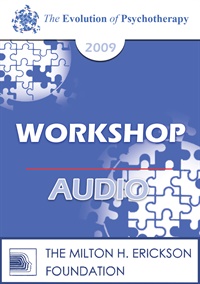
- Average Rating:
- Not yet rated
- Topic Areas:
- Workshops | Children and Adolescent Therapy | Gestalt | Psychotherapy
- Categories:
- Evolution of Psychotherapy | Evolution of Psychotherapy 2009
- Faculty:
- Violet Oaklander, PhD
- Duration:
- 1 Hour 58 Minutes
- Format:
- Audio Only
- Original Program Date:
- Dec 13, 2009
- Short Description:
- Dr. Oaklander will present an approach to working with children and adolescents that involves a variety of projective, creative and expressive techniques with Gestalt Therapy theory, philosophy, and practice as the underlying framework. Included will be an overview of the Oaklander model of the therapeutic process, case material, a direct experience, and discussion.
- Price:
- $15.00 - Base Price
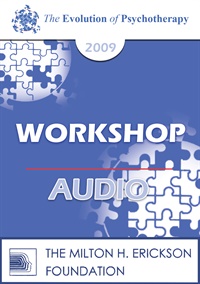
- Average Rating:
- Not yet rated
- Topic Areas:
- Workshops | Psychotherapy | Relationships | Religion | Life Focus Community
- Categories:
- Evolution of Psychotherapy | Evolution of Psychotherapy 2009
- Faculty:
- Erving Polster, PhD
- Duration:
- 1 Hour 39 Minutes
- Format:
- Audio Only
- Original Program Date:
- Dec 13, 2009
- Short Description:
- Extrapolating psychotherapy leadership private sessions into Life Focus Communities would expand therapy’s inter-relational purpose, combining the treasures of belonging with the inspirational powers of people joining together in a continuing examination of the lived life. Dr. Polster will offer some novel comparisons with religion and demonstrate through experiential exercises how such groups may be conducted.
- Price:
- $15.00 - Base Price
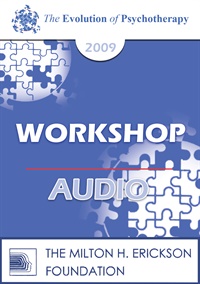
- Average Rating:
- Not yet rated
- Topic Areas:
- Eye Movement Desensitization and Reprocessing (EMDR) | Workshops | Memory | Psychotherapy
- Categories:
- Evolution of Psychotherapy | Evolution of Psychotherapy 2009
- Faculty:
- Francine Shapiro, PhD
- Duration:
- 1 Hour 56 Minutes
- Format:
- Audio Only
- Original Program Date:
- Dec 13, 2009
- Short Description:
- EMDR directly addresses the physiologically stored memory networks that underlie both psychological problems and mental health. This orientation to both case conceptualization and treatment will be explored to address diverse clinical applications, including attachment issues, body image, chronic pain, substance abuse, sexual dysfunction, personality disorders, and other presenting complaints. The Integration of EMDR with family therapy practices will also be discussed.
- Price:
- $15.00 - Base Price
Please wait ...

